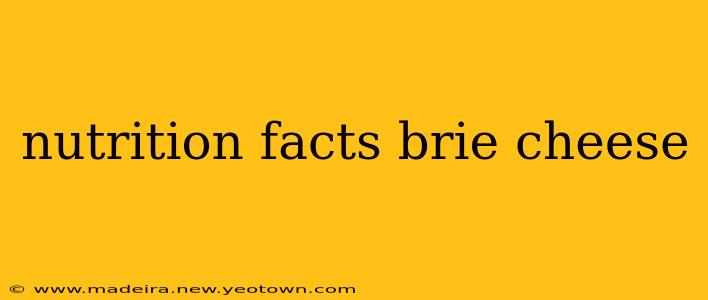Brie. The name itself conjures images of creamy, decadent indulgence, often served with crusty bread and a crisp glass of wine. But beyond its delightful taste and texture lies a nutritional profile that's worth exploring. Let's uncover the facts behind this beloved cheese.
What are the nutritional values in brie cheese?
The nutritional content of brie can vary slightly depending on the brand and how it's made (e.g., the milk source, aging process). However, a general serving size of one ounce (approximately 28 grams) typically contains:
- Calories: Around 95-100 calories.
- Fat: Approximately 8 grams, with a significant portion being saturated fat.
- Protein: Around 7 grams, providing a moderate source of protein.
- Calcium: A good source of calcium, contributing about 10% of the recommended daily intake.
- Sodium: Brie can be relatively high in sodium, often exceeding 100mg per ounce, so it's something to be mindful of if you're watching your sodium intake.
Is brie cheese high in cholesterol?
Yes, brie cheese is relatively high in cholesterol. The cholesterol content varies slightly based on the specific brand and production method, but generally, a one-ounce serving will contain a notable amount of cholesterol. This is a key consideration for individuals who need to monitor their cholesterol levels.
Is brie cheese good for weight loss?
Brie's high fat and calorie content means it's not ideally suited for a weight-loss diet if consumed in large quantities. While it does offer some protein and calcium, the caloric density makes it a food to enjoy in moderation as part of a balanced diet, rather than a staple for those aiming to shed pounds.
How much brie cheese should I eat per day?
There's no single answer to this, as it depends on your overall diet and health goals. Moderation is key. Enjoying a small portion (1-2 ounces) as part of a balanced meal or snack is usually fine for most people. However, if you're watching your cholesterol, sodium, or saturated fat intake, you may want to limit your consumption further. Always consult a nutritionist or doctor for personalized dietary advice.
What are the health benefits of brie cheese?
Despite its higher fat content, brie does offer some potential health benefits:
- Calcium: It's a good source of calcium, which is essential for bone health.
- Protein: It provides a decent amount of protein, contributing to satiety and muscle maintenance.
- Conjugated Linoleic Acid (CLA): Some studies suggest that certain cheeses, including brie, may contain small amounts of CLA, which has been linked to various health benefits, but more research is needed.
Is brie cheese healthy?
Whether or not brie cheese is "healthy" depends entirely on context. It's not a health food in the sense of being packed with vitamins and low in calories. However, as part of a balanced diet, enjoying it in moderation won't be harmful for most people. The key is portion control and mindful consumption. If you're concerned about any aspect of your diet, consulting a registered dietitian or nutritionist is always recommended.
Remember, this information is for general knowledge and shouldn't replace professional dietary advice. Consult a healthcare professional before making significant changes to your diet, particularly if you have underlying health conditions.

